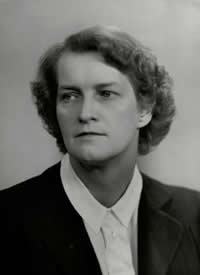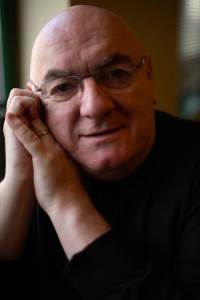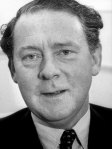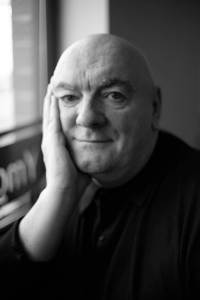In another EXCLUSIVE for CARDIFF EAST Peter Cox writes about the influences that shaped his life. He moved his management consultancy business to Cardiff after emigrating here 15 years ago: it became a Wales Fast Growth 50 Company. He was a board member and trustee of Cardiff’s Chapter Arts Centre for seven years and its chair for two, putting in place its recent, £3.5M, RIBA award winning, refurbishment. He is now chair of Cardiff Civic Society which has recently prepared a response to the Cardiff Council plans for a new Local Development Plan. He writes here in a personal capacity.
I had no idea when I was in my middle teens that there were people who didn’t know about politics. At school, after a quick brush with kings and queens, even then coming to the conclusion that they were of little use, we moved on to British Social and Economic History. By 15 I knew about the Chartists on Kennington Common (which I walked on every day to school), the difference between a Luddite and a Leveller, and the importance of the antislavery movement and the suffragettes. If my post war, run down, Victorian housed, but inspirationally teachered school wasn’t designed as a socialist nursery, it certainly managed the task well.
What gave us all such a practical grounding, and even more importantly, a desire to be involved in, politics? I was recently asked to reflect on the impact of my school and began to think that it was something to do with the extraordinary mix of teachers – all men of course – in that period just ten years after the Second World War.”
There were a few, almost past retirement, who’d kept the school going during the war, still wearing black gowns, and bemoaning that, even in Brixton, we didn’t learn Latin, and insisted on good handwriting. (Thank you for that!). There was another group who had taken the fast track teacher training course after serving in the war among whom were two Battle of Britain fighter pilots, one with facial surgery scars that constantly reminded everyone of his contribution to a civic society. And then there was the new blood, unsullied by tradition or war service, and fired with egalitarian ideas and ideals.
On reflection this was perhaps a unique mix of teachers who shared an absolute passion for education through which we would become active, involved, and intelligent citizens. What was extraordinary, was that this was not a grammar school in Westminster or Harrow, but a secondary modern in a deprived part of south London.
We were taught to have a voice. We had a school Parliament that met regularly. I still have some of the school magazines that we, the pupils, produced on a duplicator (see Wikipedia for explanation of this). For three years running I led the school’s debating team which won most of the Rotary Club competitions across London.
Not surprisingly, with such a good grounding in how government worked, many of us at 14 and 15 became involved in politics. I watched, too young to be a conference delegate as Hugh Gaitskell passioned, “There are some of us, Mr Chairman, who will fight and fight and fight again to bring back unity and honesty and dignity, so that our party with its great past may retain its glory and its greatness”.
I was a steward – with arm bands – at the massive “Let’s Go With Labour” rally that took over Battersea Park and its funfairs built for the Festival of Britain just a few years before. Here Gaitskell addressed the biggest crowd I’ve ever seen. Months later he was dead. And in Scarborough in 1963, this time as an official delegate of the Southwark Labour Party, I first heard Harold Wilson.”
By then I had began to work in local government at first for Southwark Borough Council as a junior, very, clerk in the health department. In those days the Chief Medical Officer personally assessed the fitness of every member of the council staff. My job included carrying the pee bottles that were an essential part of a checkup. The red brick, Victorian, council offices were immediately opposite the terraced house in Walworth Road where we met as Southwark Young Socialists. That house now is called John Smith House and was for many years the Labour Party HQ.

Dame Evelyn Sharp is acknowledged as one of the most outstanding and formidable Civil Servants of her day. Dame Evelyn was the first female Permanent Secretary and she received equal pay ten years before other women in the Civil Service.
More experience in local government as a junior committee clerk in planning was a prescient move it now seems. Soon however I got my taste of “real” government in the Information Office (as it was so quaintly called) of the Ministry of Housing and Local Government run by Dame Evelyn Sharp, or the Minister – depending on which view of history you take – Richard Crossman. In the 1960’s there was an absolute division between the civil service and the politicians. As a press officer our only function was to provide information. The notion of massaging the news simply didn’t exist. That didn’t mean not trying to get the best publicity for the ministry’s work, but it did mean avoiding at all costs anything that smacked of media manipulation or massaging a minister’s ego.
I happened to share a grand office that faced onto Whitehall itself. Two rooms along were a team of people, some arriving for work in the early hours of the morning, who hand cut the press clippings from national and local newspapers that would enable me to write the minister’s daily press summary. Nine copies, carefully typed on a manual typewriter, with no means of alteration, had to be ready by nine o’clock: or else. I never discovered what “or else” actually meant.
Because of my job role, I did actually get to meet the Minister. On one occasion he even sent for me, an event that sent his private office and my boss, and his boss, into a civil service spin. I had, apparently, upset a reporter on The Times. After crossing the acres of carpet to his desk Crossman asked me what had happened. I explained it had been late as I answered the phone to an irate reporter demanding information that couldn’t be given since, at 6:15 pm the Registry, where all files lived, was already closed. I told the journalist I’d get the information the next morning, and thought that was that.
Crossman explained that, without knowing anything of what had happened, he had told the editor of The Times that if his reporters upset his press officers he would simply stop speaking to the newspaper. Conversation ended, I crawled out, humbled. You don’t forget that kind of leadership.”

The Minister Richard Crossman. The government sought to legally block publication of his 'Diaries of a Cabinet Minister' that were to be the inspiration for the television series Yes Minister.
Working there I was lucky enough to have friends in other departments including Number 10, the front door of which I crossed on many occasions – delivering packets for more important people! I knew that the politicians of that era were dedicated, principled and very hard-working. So what might be different today?
Certainly a blurring of the distinction between the public civil servant and the politician. Spin doctoring on taxes? We now have it, for better or worse.
Scrutiny of our politicians? Almost certainly less than 40 years ago. Not least because we have had generations who didn’t have the kind of grounding in how to engage in civic life that I, and I’m certain much of my generation, had.
I know how local and national government works, at least in principle. I sat in the House of Commons, for example, during Macmillan’s Profumo Affair speech when an exhausted prime minister tried to save his rotten government. That bit might sound familiar, but the speeches were different, the people were different. The next day there was extensive verbatim coverage in newspapers of record: no 24-hour rolling news bites and instant ‘expert’ analysis to make up our minds for us. We were given the means by which to make informed judgements and reach opinions based on some historical understandings, and of course our own political views.
My father became a councillor in that 100% Labour run rotten borough I had worked for. I was to leave London and Labour; the party several times,
as principles got thrown out with bathwater. But I became an enthusiastic founder member of the SDP and stood several times in local government elections with “Liberal Support”. But unlike my dad, I regarded narrowly failing to win council seats as a good result!
Moving to Wales 15 years ago I’ve had to learn much about politics. Those history lessons about nationhood came in really useful. There is so much to admire and take from Wales’ unique cultural perspective. There is also much to depress: the tribalness of politicians who say they deplore just that very thing; the lack of competence in public life; the dissonance between citizens and their elected representatives.”
As a nation, we have some extraordinary aspirations: for examples, a carbon neutral country, to have our own distinct education system, and a determination to safeguard the culture of Welsh and English speaking Wales. But to me, it seems to be a place that still has to discover for itself those virtues that are so obvious to incomers. And to set those standards and aspirations in public and political life that I so took for granted in my teens.
You can follow Peter D. Cox on
twitter: @peterdcox
The South Wales Echo – 27th July 2010 – recommended Peter D Cox as one of five tweeters to follow on Twitter. The other four were Oprah Winfrey, Stephen Fry, Geraint Thomas and Your Cardiff.
website: www.pdconair.com
blog: www.peterdcox.me.uk
Further Reading
Peter D. Cox imagines what Cardiff will look like in 2020 for YourCardiff.
Council’s LDP proposals still fall short, says Civic Society – Guardian Cardiff.
Filed under: Cardiff East | Tagged: Cardiff Civic Society, Peter D. Cox |












[…] My political grounds – a guest blog Posted: August 13, 2010 by peterdcox in Politics 0 This Guest Blog was requested by Cardiff East and appeared on their blog on August 12th 2010 […]
[…] with the reminiscing stuff? First I get asked to reflect on my own ancient history – politics wise – and then there’s the urge to ensure that all my blogs are got in the same place, again. This […]